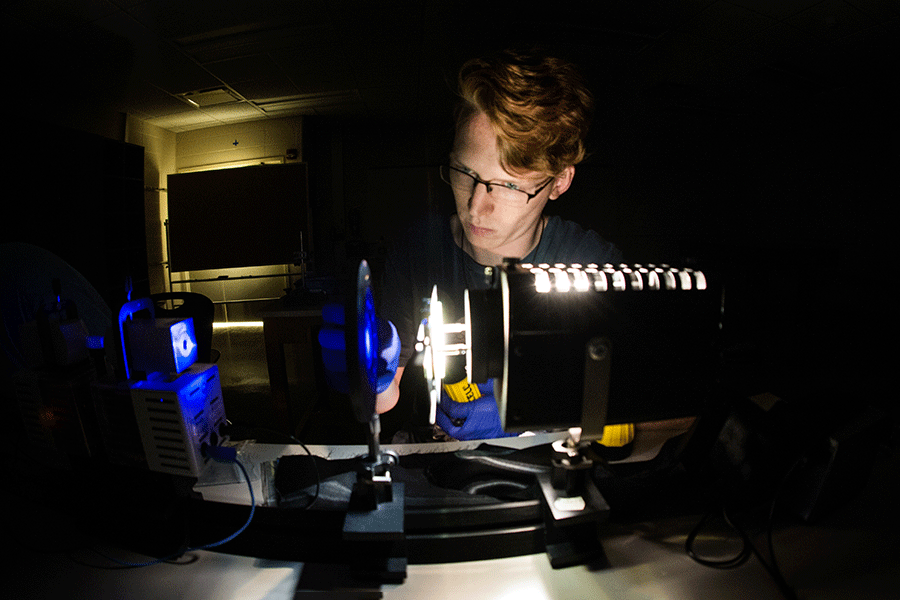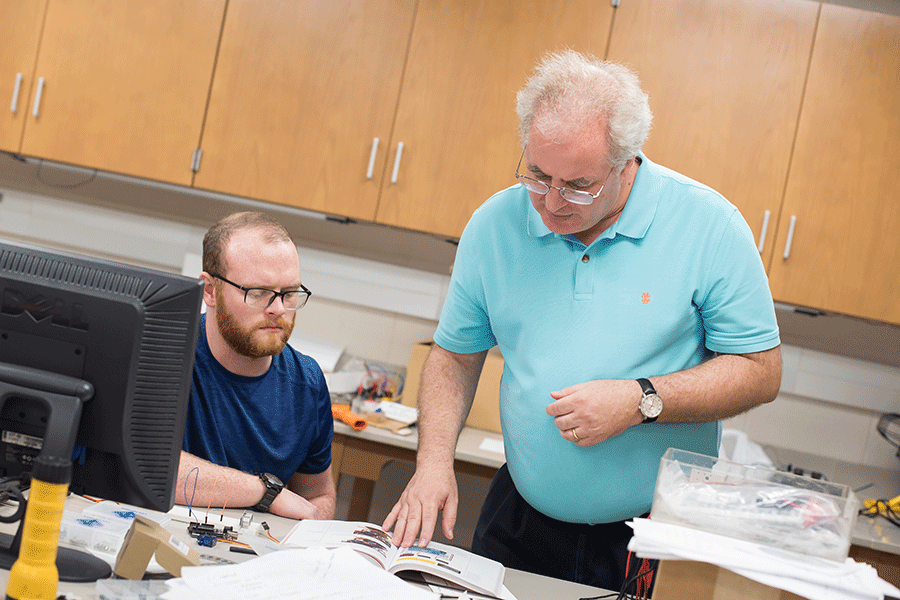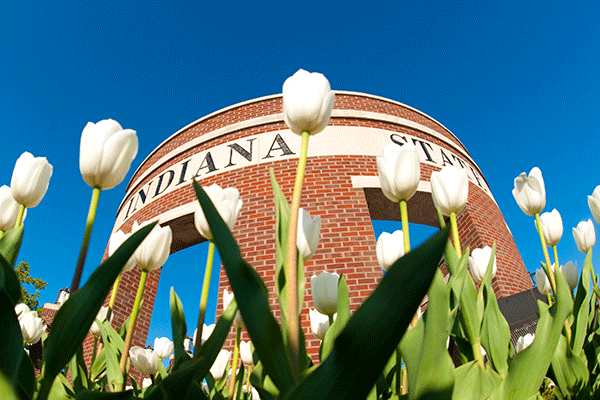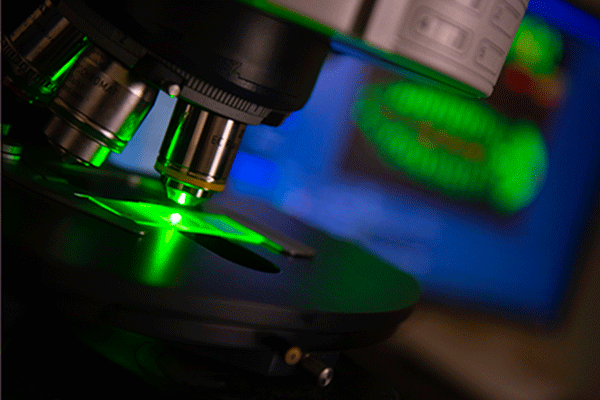Why Earn a Bachelor’s Degree in Physics at Indiana State?
If you have a passion for understanding how things work and enjoy scientific experiments and mathematics, you will love Indiana State’s Physics Program. Physics seeks to increase human knowledge of matter and energy in the universe, from atomic nuclei to galaxy clusters, and to apply this knowledge in the development of new technologies.

Unique Sophomore Experience
This program offers a unique sophomore course experience involving project-based learning in theoretical and experimental physics. You will build and program microcontroller circuits for real-world measurements, and gain a comprehensive theoretical toolkit for tackling complex physical scenarios. This approach ensures that you will be well-versed in practical skills and methodologies used in industrial and academic research.
You will also learn the revolutionary concepts of special relativity and quantum mechanics and how they underlie modern physics research and applications in fields such as atomic physics, nuclear physics, and laser optics.
Benefit from Faculty-Mentored Research Opportunities
A central feature of our program is the opportunity to work closely with faculty to build a strong foundation in scientific principles and techniques. You will have opportunities for research in modern laboratories in a supportive, yet challenging, environment with accessible faculty members and personal mentoring.
You will have opportunities to present your results at regional and national scientific meetings, and your research findings may be published in scientific journals. You may receive course credits for research or be employed as research assistants. Full-time, ten-week paid summer research fellowships are also available.
Learn from Our Excellent Faculty
As a physics major at Indiana State, you will benefit from small classes taught by faculty with diverse specialties, including theoretical nuclear physics, experimental spectroscopy, nanomaterials, and computational physics. Faculty work one-on-one with students in their labs, mentoring them and guiding them on individualized research projects.
Most instructors hold doctoral degrees and publish articles, conduct research, edit scientific journals, and speak at national and international meetings within their specializations. The Chemistry and Physics Department has long been recognized for excellence in teaching, research, and service; recent faculty awards include the Caleb Mills Distinguished Teaching Award; the Theodore Dreiser Distinguished Research and Creativity Award; and the President’s Medal, the University's highest award for faculty.
Enrich Your Learning
You may participate in activities and organizations that enable you to interact with other students and professionals in the industry, including the University's chapter of the Society of Physics Students—and Sigma Pi Sigma, the physics honor society. These, and more than 100 other highly accessible student organizations, provide opportunities for involvement and leadership that will enrich your learning.

What You’ll Learn in the Physics Program
As a physics major, you will complete the core curriculum that provides a strong foundation in physics and problem-solving skills. In addition, you will complete the coursework required for one of our degree options (listed below). In consultation with your academic advisor, you will choose the option that best meets your interests and career goals.
Bachelor of Science (BS) in Physics
This program is designed for students who wish to pursue careers in science, computing, engineering, or research, or to enroll in graduate programs in physics.
Physics BS Concentrations
All physics majors take the same courses during the first two years of study, so you will have enough time to consult with your advisor before choosing the option (listed below) that suits your career goals
Physics BS Concentrations
This concentration focuses on areas where the techniques of chemistry and physics are brought together for the study of atoms and molecules; their interactions in gases, liquids, and solids; and the detailed structure and dynamics of material changes. Chemical physicists are employed by a wide range of businesses, particularly the pharmaceutical, photographic, and microelectronic industries.
This concentration focuses on applying the principles of physics to develop new technologies and solve interdisciplinary engineering problems. Graduates may pursue an advanced degree in applied physics or engineering, or work in industry or government as engineering professionals.
View the Engineering Physics Concentration Degree Map (Odd Admission Year)
View the Engineering Physical Concentration Degree Map (Even Admission Year)
This concentration is designed to supply the background and experience needed to enter graduate school or become a research physicist in an industrial, academic, or government setting.
Bachelor of Arts (BA) in Physics
This program is designed for students who wish to pursue secondary teaching opportunities or combine their interest in physics with a major or minor in another discipline. The BA requires fewer courses than the BS degree options, so it is a good choice for students who switch to a physics major later in their college career.

Transfer Credit
Indiana State University accepts credit from regionally accredited colleges and universities within the United States, and from selected schools located outside the United States. Credit also may be granted for military training and experience. Previously earned college credit can be applied toward completion of the program per Indiana State's transfer guidelines.
Transfer GuidelinesCareer Possibilities for Physics Majors
Physicists excel in solving complex problems, which allows them to seek employment in a wide range of academic, government, and industrial settings well beyond the traditional boundaries of physics.
The Bureau of Labor Statistics projects the overall employment of physicists to grow 8 percent from 2021 to 2031. In the United States, the employment rate for physics degree recipients six months after graduation is currently 98 percent.
Maximize Your Experience at Indiana State
Explore our Honors College to learn how you can maximize your college experience with faculty mentors, undergraduate research, internships, and Honors housing. Students in the Honors College also enjoy opportunities to travel across the nation and abroad for conferences, service-learning trips, and immersive academic and cultural studies.
Learn About the Honors CollegeRelated Programs
-

Science Education (BS)
Bachelor's
-

Chemistry (BS/BA)
Bachelor's
-

Biology (BS)
Bachelor's

